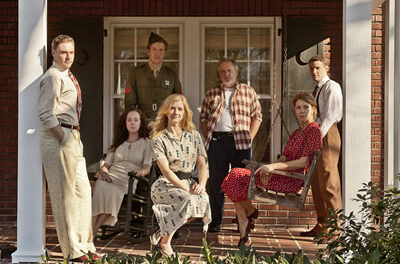Continuing its season featuring contemporary works, the Chamber Orchestra of the Triangle‘s matinee concert offered a varied program spanning more than two centuries of music. Each concert of their 2013-14 season showcases at least one 20th– or 21st –century composer, from heavy-hitters like Webern and Satie to lesser-known names such as Turina and Dallapiccola. Sunday’s concert celebrated Durham composer Robert Ward, who passed away less than a year ago after an eminent tenure at the North Carolina School of the Arts and Duke University. Yet, while performing contemporary music is adventurous enough, Maestro Lorenzo Muti programmed an exciting mix of old and new works that, despite their chronological disparity, highlighted the capabilities of this small orchestra.
The program’s opening, the 1775 Sinfonia in F of CPE Bach (Wq.183/3, H.665), was an exciting take on a seldom-performed composer. Bach’s symphonies are ill-suited to the labored forces of a full symphony orchestra, and, as one critic put it, “occupy a somewhat enigmatic position in the history of the symphony.” The three movements of the Sinfonia in F reflect the Northern German string symphony tradition, a tradition also seen in some of Haydn’s early symphonies. Maestro Muti’s introduction from the stage referred to Bach’s sensitivity as a prefiguration of aspects of Romanticism. Muti, who conducts without a baton, invigorated this music through his discrete gestures. The Sinfonia in F is frequently confusing and belies classical expectations; the first movement, for example, does not end, but slows to whole notes introducing the next movement. Especially notable was the second movement, which begins as a duet between the low strings. Despite its “larghetto” tempo, the music danced like a sarabande, the orchestra obviously savoring the beautiful simplicity of Bach’s orchestral writing.
Muti called Robert Ward “one of the great artistic figures of Durham.” Ward, who has been covered elsewhere in these pages, rose to national prominence with his opera The Crucible, for which he won the Pulitzer Prize in 1962. His Symphony No. 6, which was performed at this concert, was a commission from Brevard Music Center in 1988; the Chamber Orchestra of the Triangle, then called the St. Stephen’s Chamber Orchestra, released the first recording of this symphony in 1990 (reissued here), but the recording featured only one instrument per part. Sunday’s performance offered a full string section, which created a warm sound to accompany the piano and winds, which were assembled in the center of the stage. The harmonies of Ward’s music bear the “American-ness” of his contemporaries and teachers, such as Copland and Hanson. The piece frequently doubles the winds, and the whole orchestra was consistently synchronized. The subdued effect created by solo bassoon and muted low strings in the second movement was particularly magical, and the harmonies and parallel fourths of the whole ensemble were perfectly placed.
Concluding the program’s first half were two preludes from Verdi’s La Traviata. The Act I Prelude, which prefigures both the raucousness of Violetta’s party and the forthcoming tragedy of her death, is repeated nearly verbatim in the Act III Prelude, but in a different key and with a greater pathos. Although a disembodied prelude is an odd choice for a chamber orchestra, Muti noted that the performance was a belated celebration of Verdi’s bicentennial.
Andrew Tyson returned to his Durham home to perform Beethoven’s Piano Concerto No. 3 in C minor, Op. 37, with the Chamber Orchestra of the Triangle. Tyson, a graduate of Curtis and Juilliard, brought out the blitheness of early Beethoven. His attention to detail, especially evident in the upper-register rubato passages, was exquisite, and his ability to shift through the varying moods of the concerto was uncanny. Tyson executes his grace notes with a sense of humor, and every beat felt perfectly placed. The orchestra supported the soloist well and followed him in his ghostly poetic lyricism. The occasional missed note did not detract from the virtuosity of Tyson’s Beethoven, a virtuosity that was at once youthful and learned. His encore, Leopold Godowsky’s solo piano arrangement of “The Swan” by Saint-Saëns, displayed his facility with complex, multi-voiced works and thrilled the audience. His informed playing lacks the pedanticism we see in so many other young musicians, and we should expect to see Tyson filling larger concert halls as his career progresses.
The Chamber Orchestra of the Triangle next performs a program entitled “Romantic European Riches” on February 16, 2014. For details, click here.











